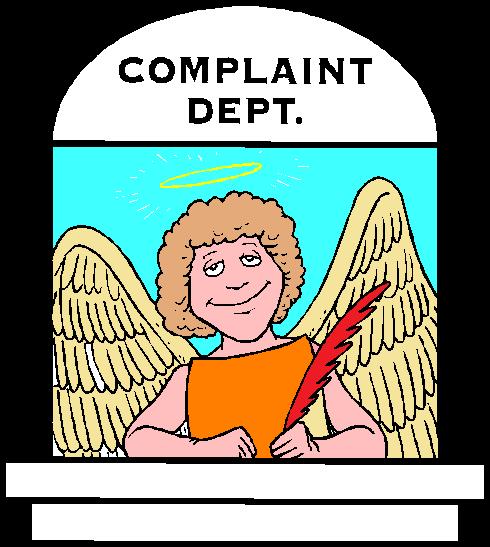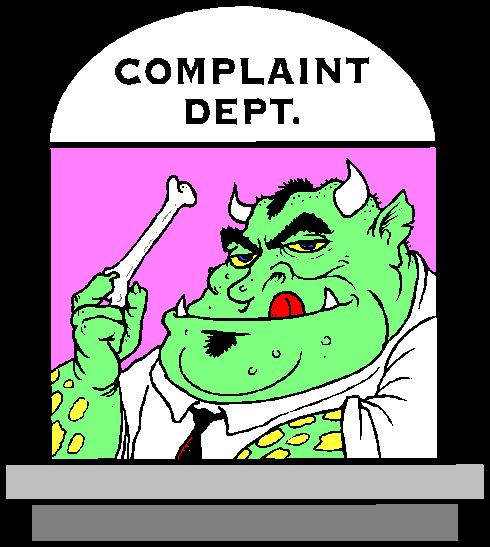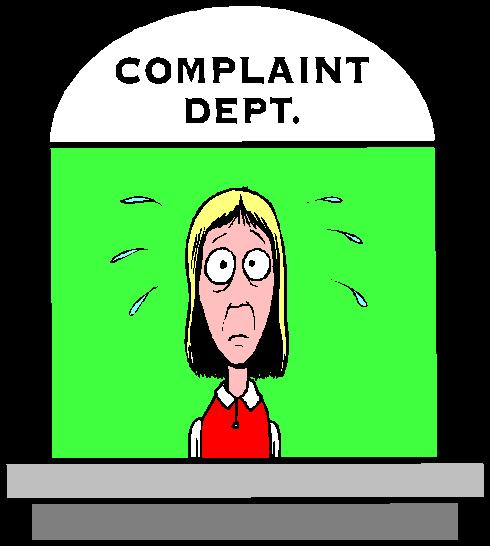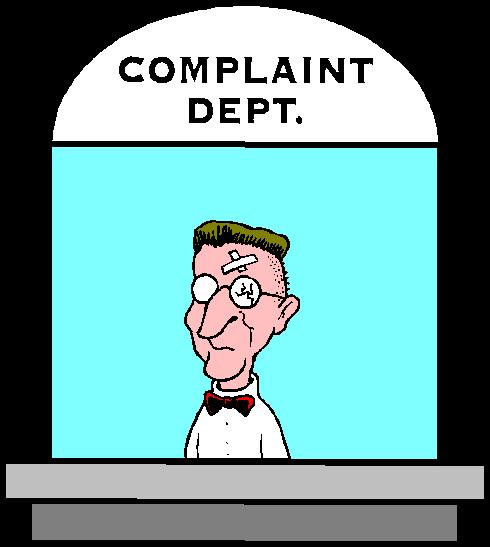How To Handle Complainers And Complaining
Chronic Complaining
We have all at one time or another been the effect of someone who is constantly complaining about one thing or another or one person or another. Whining, moaning, groaning, finger pointing complaining can drag down a work environment, a team, a family, an individual or a group. On the other hand complaining is something that most of us have been guilty of doing at some point in our lives. It is when the complaining is chronic,when there is no other topic up for discussion and no means of pulling the complainer's attention off the target of their complaint that it becomes a huge threat to the viability of the environment the complainer operates in.
If the chronic complainer is not handled or not removed the environment becomes toxic. Left to go on too long and others will legitimately start complaining about the complainer. In this article you will find information that will assist you in discovering what drives the complaining and some tips for how to handle complainer. If you find yourself feeling the urge to complain that there is too much information here and all you want is a solution - complain no further and scroll down for an easy solution. However, it is important to know, when handling a chronic, constant complainer that the more knowledge you have as to what is driving them the better prepared you are to put an end to it.

Solution Oriented Or Problem Fixated?
There is a vast difference between a legitimate complaint wherein one voices their dissatisfaction or concern regarding an unwanted situation or a flawed product and the kind of complaining wherein accusations are made and fault finding is the predominant theme. If you are complaining about a valid situation or circumstance then you will find yourself inclined to problem solve rather than carry on at great length pointing fingers and hurling accusations . When you are complaining about someone or something are you solution orientedor problemfixated? Many of us have been complainers at some time in our lives and many times our constant complaining has alienated us from others.
Depending upon what your legitimate complaint may be there are many proactive ways in which situations may be resolved. When handling such a complaint it is imperative that you stick to the facts and the correct sequence of the actions or lack of actions that led up to yourcomplaint. There are numerous resources for the resolving of issues that lead to a successful outcome putting an end to yourcomplaining . The chronic complaining of chronic complainers is another matter entirely.

Monstrous Complaints!!!
Attempting to handle thecomplaints of those who engage in
the practice over long periods of time or who are continually dissatisfied with
people, things and life in general is a good deal more complicated. The reason for this is that the chronic
complainer is not looking for a resolution. What the complaining complainer is looking for is agreement – poor me;
look at what they did to me; isn’t it just awful, and on it goes. It is all “look over there not at me”. The reason such a complainer wants you to
“look over there” is simple – they have something hidden that they don’t want
to know about themselves and have buried or they have something hidden that
they do not want others to know about them. The complainer generally piles so much stuff onto the original decision to hide something they have done or not done that they create monstrous complaints to camouflage their actions or their failures to act.
The best way to keep yourself out of the crab trap set by a constant crabby complainer is to not go into agreement with their story. If you do go into agreement with it you will be caught up in their game, you won’t be playing your game anymore and your focus, attention, energy, emotions and thoughts will be tied up on the “poor me” other trying to resolve a problem that is not yours to begin with. Many problems that we have in life continue to be problems only because we have mis-owned them, taken them on and made them ours when in fact they are not. Victims like company as their reality, like any other reality, is based on agreements. The more real they can make their situation the less they have to look at the cause of the situation – themselves. If the complaint is not legitimate (as in solvable and not accusatory) then save yourself the anguish of joining in the chorus of moaning and groaning . Chronic complainers are unaware that they give themselves away to others. They use generalities like you always, you never, everyone, nobody and the like.

Fear Of Being Found Out
The continual complainer is communicating loud and clear that they are in a negative mind set however that is not all that the complainer is revealing to others. the truth is they have a huge fear of being found out . Complainers cannot get ahead in life, they are stuck in some past upset that was of their own making and they DO NOT WANT TO KNOW ABOUT IT, they do not want to look and they do not want anyone else to find out about it. It doesn’t necessarily take a big, horrible, dastardly deed to bring these phenomena about, it can be a small thing but it is a big deal to the person who has the kept or who has caused harm to another or an area of life. An example would be a person who constantly and continually complains about how dishonest so and so is. This individual may have done something as simple as having taken a quarter out of his or her mother’s purse when they were nine years old. They didn’t get caught, they felt horrible about it, it went against their integrity, they didn’t want anyone to find out about it, the event is then “buried, hidden from their conscious mind and they go on with their lives. Down the line someone takes something from them and rather than being able to deal with it in an open, honest, forthright manner confronting the other party directly they begin to complain and loudly. “Methinks he doeth protest too much” is not an ill-founded statement.
A chronic complainer will even go so far as to complain about other complainers. They are extremely critical and exist in a constant state of upset. They seldom look you in the eye and they see only negativity and what is “wrong” with others. If you do not take ownership of your negative and often downright harmful actions you will constantly find yourself at the effect of others negativity and resulting actions. A person who has harmed another or others will seek to be punished, even if the harm done exists only in the theatre of their mind and they perceive they have done something harmful. No actual harm has to have occurred it is the perception that it has occurred that causes the manifestations.
So if a chronic complainer is not solution oriented how do you handle them? You handle them with “kid gloves”. If you find yourself going into agreement with them then you have to step back and look at what it is they are complaining about. If you feel yourself being “drawn in” chances are you too have a similar withhold lurking in your past. Simply be honest with yourself and look to see if you have ever done something similar. Taking ownership of it allows you to deal with what is actually in front of you here and now. You might gently ask them if they have ever done anything like the nature of their complaint. Do not make them wrong for it as it will only serve to bury them even farther in their attempt to bury their past. Somewhere along the line they made the decision that nobody must know and considering both you and them are both a “somebody” both of you are included in that past decision. Just gently draw them out so they can look. That is all you want them to do is look, nothing more. They will be free then to make a different choice, or not. It is not in your control as to whether they make the change or they do not.
Victim, Victim, Victim

Childish Complaints
Speaking of "kid gloves" it is vital that we, as parents and adults handle the stolen cookie or stolen quarter. In a child's universe the quarter can be a big theft and therefore, in their minds they have committed a "big crime". Often children who are “acting out” have done something they should not have done and are “hiding” it. Through their destructive behavior they are seeking to be punished. When my children have displayed this kind of behavior the first question I asked them is “What have you done that you don’t want me to know about?” Gently asked them, not demanded from them – big difference. Once the deed is out in the open it can be discussed, reasonable consequences can be applied if necessary and your pleasant, happy child returns to the fold in harmony with himself and his environment once again. Children are basically honest – we were all children at one time and therefore we are all basically honest. It is when we have been dishonest with ourselves and others that life starts to get complicated. Often children will hide their actions only because the adults around them, having similar “kepts” themselves will react rather than respond to their children. The adult may make a "federal case out of it". And so it is that the child’s inability to deal with a reactive, negative environment that causes them to hide their misdeeds.
Another thing worth mentioning here is that adults often pass the "small things" off as childish behaviour taking the attitude that the child will learn or "grow out of it". The shortfall in that think is that it may be a small thing in the adult's universe but to the child, their dishonesty is a big thing. Some children actually begin to do bigger and bigger things in order to pull in the punishment for their "crime". Bewildered parents are at a loss as to what happened to their once sweet tempered and good-natured child. Once the child has "come clean" the bad behaviour will subside. It is an opportunity to have the child take responsibility and handle the consequences for their actions. The responsibility must be within the child's means to take and the consequences must be balanced to the "crime". To not respond or to overreact teaches the child nothing other than irresponsibility on the one hand and to fear to be honest on the other. When parents who fail to respond out of fear of hurting their child leave that child to society to deal with. Society does not love your child the way you do and is not so tolerant and empathetic when meting out consequences. If parents do not step up then life steps in and it's lessons and consequences can be much harder to bear.
Ask The Right Questions
An effective means of handling a complainer is to ask them "What are you willing to do to solve the (name the complaint)" or "What are you willing to do to resolve the __________?" or "What can you contribute to resolving the _________________?" If they are not willing to go into positive action on it your question will serve to stop them from complaining about a person or situation that they are not willing to take any responsibility for.
Life can get really complicated but the reasons that it does get complicated are in truth very simplistic.
When confronted with a chronic complainer the K.I.S.S. method is the most optimum method of dealing with it.
- Do You React Or Do You Respond To Your Child?
There is a vast difference between reacting to your child's or teenager's behaviors and responding to them. It is vital that, as a parent, you are aware of the difference between reacting and responding ... - How To Get Into A Pickle
The most important thing that you have to know in order to get into a pickle is that you must start from a positive position . If you are not in a positive position before you get into a pickle then you are... - How To Handle A Tattletale
It is important to teach your children the difference between a tattle tale and a legitimate complaint or vital information! I recently read Kate Gosselin's blog wherein she was asking for help with her...
The people who live in a golden age usually go around complaining how yellow everything looks. ~Randall Jarrell








